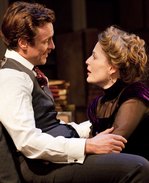SITE GUIDE
SEARCH
REVIEWS
REVIEW ARCHIVES
ADVERTISING AT CURTAINUP
FEATURES
NEWS
Etcetera and
Short Term Listings
LISTINGS
Broadway
Off-Broadway
NYC Restaurants
BOOKS and CDs
OTHER PLACES
Berkshires
London
California
New Jersey
DC
Philadelphia
Elsewhere
QUOTES
TKTS
PLAYWRIGHTS' ALBUMS
LETTERS TO EDITOR
FILM
LINKS
MISCELLANEOUS
Free Updates
Masthead
Writing for Us
A CurtainUp  London Review
London Review
 London Review
London ReviewA Doll's House
|
Maybe, just maybe, this is what we needed. Maybe a miracle is going to occur in this very house.
— Nora
|

Toby Stephens as Thomas and Gillian Anderson as Nora
(Photo: Johan Persson) |
Zinnie Harris' new version of the Ibsen classic is a fairly modest relocation, moving the play forward just thirty years to 1909 and shifting the action from Norway to London. Bank manager Torvald Helmer becomes politician Thomas Vaughan (Toby Stephens), newly appointed as a cabinet minister. The lawyer Krogstad is another politician: Neil Kelman (Christopher Eccleston) recently deposed because of fraud allegations and replaced by Thomas Vaughan. Other than these changes, the plot remains largely unchanged: exploring the limited role women were allowed to play in society and men's one-dimensional, restrictive attitudes towards them.
The modifications mean that the original's emphasis on money is instead transposed into public and political fortunes. The precariousness of a politician's reputation both ameliorates the men's harsh decisions and makes them psychologically more explicable. With more obviously at stake, their true, ugly attitudes are revealed when thoroughly backed into a corner. Moreover, the theme of political scandal is one which still speaks to a 21st century audience with very little leap of imagination.
Although the play's repositioned setting is broadly similar to the original, the translation's dialogue is thoroughly modernised and zips along at a speedy pace. At times, the contemporary text might feel a little anachronistic, but this is a small price to pay for an engaging, accessible evening with vibrant and realistic characters.
The characters themselves are truly brought to life by spirited, individualistic performances from an impressive cast. Most notably, Gillian Anderson's endearing performance as the "edible" Nora suitably navigates the transition from the "doll" wife, the charming yet confined object of desire into realisation and independence. Her husband played by Toby Stephens, is magnificently supercilious and with priggish, self-righteous bombast delivers lines such as: "You have no idea how important I am, do you? ". Christopher Eccleston's Kelman, on the other hand, is unexpectedly affecting and sympathetic. His performance as the rogue, disgraced politician, is full of intense desperation and is at once angry and vulnerable. Tara Fitzgerald as the severe, fairly dowdy Christine and Anton Lesser as Dr Rank, the family friend and Nora-admirer, are also excellent components in this remarkable cast.
The set makes full use of the Donmar's small space, with white painted bookshelves reaching beyond the ceiling with a skylight. The library itself is dominated by Indian tea crates, dust covers and a prepossessing Christmas tree. The costumes are finely selected and cleverly reflect character nuances. Therefore, whilst Nora is decked out in Cadbury purple velvets and other sumptuous material, Christine wears boiled wool and tweeds.
All in all, this subtle but winning adaptation benefits from a dazzling cast, engaging contemporary dialogue and simply oozes dramatic energy.
|
A Doll's House
Written by Henrik Ibsen In a new version by Zinnie Harris Directed by Kfir Yefet Starring: Gillian Anderson, Christopher Eccleston, Toby Stephens, Tara Fitzgerald, Anton Lesser With: Maggie Wells, Leah Daves, Abby Negus, Ted O'Neil, William Nye Designer: Anthony Ward Lighting Designer: Hugh Vanstone Composer and Sound Designer : Tim Phillips Choreographer: Aletta Collins Running time: Two hours and 10 minutes with one interval Box Office: +44 (0)870 060 6624 Booking to 18th July 2009 Reviewed by Charlotte Loveridge based on 23rd May 2009 performance at The Donmar Warehouse, 41 Earlham Street, London WC2H 9LX (Tube: Covent Garden) |
|
REVIEW FEEDBACK Highlight one of the responses below and click "copy" or"CTRL+C"
Paste the highlighted text into the subject line (CTRL+ V): Feel free to add detailed comments in the body of the email and state if you'd like your comments published in our letters section. |
|
London Theatre Tickets Lion King Tickets Billy Elliot Tickets Mighty Boosh Tickets Mamma Mia Tickets We Will Rock You Tickets Theatre Tickets |




